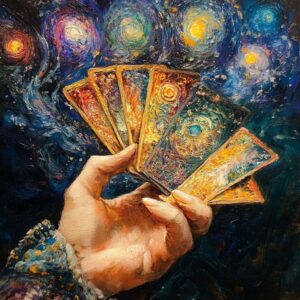
Cupid and Psyche are figures from Greek mythology. Psyche is a beautiful young girl, the youngest of three sisters. The people around her admired her and called her the "New Venus." This admiration provoked Venus's jealousy, as she couldn't understand why people were abandoning her altars and making pilgrimages to see a mortal whose beauty would fade with age, while her own beauty was eternal. Psyche's great beauty intimidated her admirers, preventing them from marrying her. Her worried parents, concerned that their daughter would not marry, consulted the Oracle of Apollo, who instructed them to leave her on a cliff, as it was her fate to marry a terrible monster resembling a serpent.
Venus demanded that her son Cupid go to where Psyche was abandoned and use his golden arrow to make her fall in love with an ugly man. Cupid descended to fulfill his mother's request but was so struck by Psyche's beauty that he accidentally wounded himself with his own arrow and fell in love with her. He then took her up to his palace from the cliff where she had been left.
To conceal his true identity, Cupid forbade Psyche from looking at him, and thus they lived together in Cupid's magnificent palace. The couple would meet every night, with Cupid gently and lovingly tending to Psyche. Although she never saw her husband, Psyche was filled with love and admiration for him. Cupid's deep love for Psyche softened his mischievous ways, leading him to leave the gods (especially Zeus) alone, as he stopped shooting his arrows that caused them to fall in love with mortals, thus avoiding much embarrassment on Olympus.
Longing for her family, Psyche asked Cupid for permission to visit her home. He placed her back on the cliff, where she met her sisters and told them about her life. Her jealous sisters convinced her that her husband was a monster intending to devour the child she was carrying. They suggested that she kill him while he slept, so they could share in the immense wealth that resided in her divine home.
Psyche returned to Cupid's palace and, one night, lit a lamp. To her surprise, she saw not a monster but a handsome man with golden hair, a perfectly sculpted body, sleeping with his wings resting motionlessly on his back—she realized it was the god Cupid.
Startled and shocked, she accidentally spilled hot wax from the lamp onto Cupid's wings, awakening him. Wounded both physically and emotionally by Psyche's betrayal, Cupid fled from the bed in an instant and returned to his mother. Venus demanded revenge (mother-in-law or not).
Psyche pleaded with Venus to reunite her with her beloved Cupid, and Venus subjected her to a series of trials. Psyche successfully completed these trials with the help of the gods and her own kindness and innocence, though her strength and hope waned. When she failed the final test and died, Cupid arrived just in time to save her from death. The gods then persuaded Venus that Psyche, despite being mortal, was a worthy bride for her son. The child of Psyche and Cupid was named Pleasure.
The love story ends with Psyche's marriage to Cupid and her acceptance among the gods. The name "Psyche" means "soul," symbolizing the perfect union of body and soul represented by Cupid and Psyche.
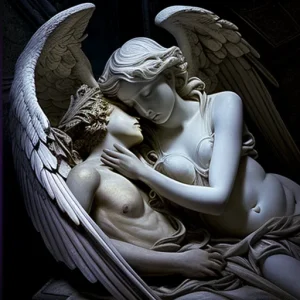
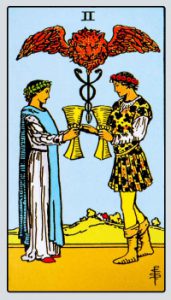
Two of Cups: Psyche's beauty arouses Venus's jealousy, prompting her to ask Cupid to make Psyche fall in love with a hideous creature. Cupid, like an obedient child, was about to fulfill his mother's command, but he fell in love with Psyche himself. To keep his identity hidden, Psyche was required not to see his face. This card represents blind love—the willingness to sacrifice for love, the desire to see only the whole and perfect, and the blindness to flaws.
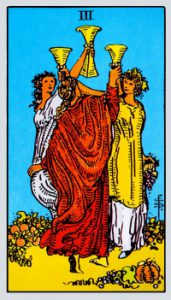
Three of Cups: Psyche lives in a palace surrounded by wealth, luxury, and a man who provides her with love, tenderness, and pleasure. She is filled with happiness and joy, despite two significant limitations: she cannot see her partner, as Cupid wants her to love him for who he is, not because he is a god. Additionally, she is forbidden from leaving the palace for fear of encountering his mother, Venus, who might kill her. This card represents joy and celebration, even when not all the details are known.
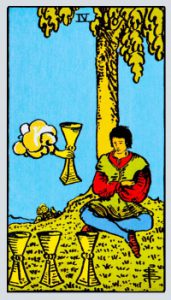
Four of Cups: The love between Psyche and Cupid grew stronger, but Psyche began to long for her family. Upon returning to her father's house, she shared that she was happy, but her sisters planted seeds of doubt by telling her that she was not married to a beloved man but to a winged serpent. Doubt began to gnaw at her, and she questioned, "Who is my lover?" This Tarot card represents doubt that undermines happiness. It serves as a warning to the querent not to succumb to doubts that can erode their joy.
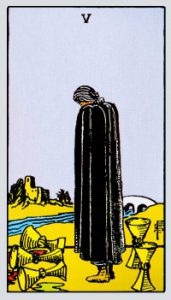
Five of Cups: Psyche returns to the palace with Cupid, but her heart is filled with doubts. She decides to uncover the truth about her lover at night, and when she discovers that he is Cupid, the god of love, she panics. In her attempt to flee, she accidentally spills hot oil on his wings. Hurt and betrayed, Cupid tells Psyche, "Where there is no trust, there is no love." He leaves Psyche, who remains despairing in the palace. This card represents despair, the need to uncover the truth, and the fear of what that truth might reveal. Regardless of whether the truth is loving or painful, once it is uncovered, it allows for the possibility to face any challenge or question.
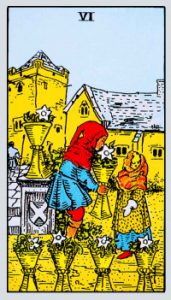
Six of Cups: Psyche did not want to return to her family home, but she also couldn't stay in the palace because the shared memories with Cupid were too painful. She returns to the rock where she was abandoned and waits. Even though Cupid does not return, she resolves to right the wrong she committed. This card represents the possibility of correcting past mistakes and symbolizes a second chance.
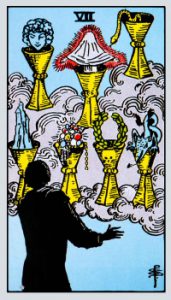 Seven of Cups: Psyche turns to Venus, who, despite her anger, assigns Psyche three difficult tasks. Despite the challenges, Psyche successfully completes them. This card represents a dream becoming reality through the querent's efforts. In some cases, when this card appears, it can indicate a situation where the groom's mother struggles to let go of her son for the sake of his bride.
Seven of Cups: Psyche turns to Venus, who, despite her anger, assigns Psyche three difficult tasks. Despite the challenges, Psyche successfully completes them. This card represents a dream becoming reality through the querent's efforts. In some cases, when this card appears, it can indicate a situation where the groom's mother struggles to let go of her son for the sake of his bride.
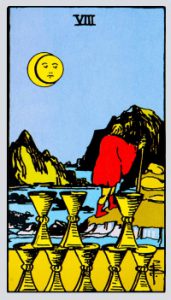
Eight of Cups: Frustrated, Venus sends Psyche on one final task: she asks her to descend to the underworld and borrow Persephone's powder of eternal beauty and youth. No mortal has ever entered the underworld and returned. However, Psyche, believing in her love, allows things to unfold. This card represents the cessation of struggle—both Psyche and the querent understand that there is nothing more to be done, and it is time to let go. It's often said that when a woman lets a man go, if he truly loves her, he will return; if he doesn't return, he was never truly hers. Letting go does not signify defeat; sometimes, surrender and silence are the correct responses.
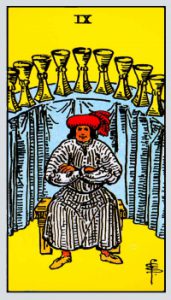
Nine of Cups: Persephone, the goddess of the underworld, is moved by Psyche's story and allows her to enter and leave unharmed, even lending her the powder. Unaware that only the gods are permitted to use it, Psyche applies the powder to herself and falls into an eternal sleep. Cupid, discovering Psyche's efforts, breaks free from his mother's control and rescues her. Cupid then asks Zeus to marry them, promising in return to stop causing trouble for the gods with his mischievous arrows. This card represents the fulfillment of a wish, personal success, and achievement. It also symbolizes the son's separation from his mother.
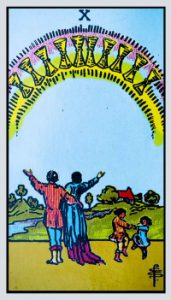
Ten of Cups: Cupid and Psyche return the next day to marry and find Venus with Zeus. Cupid prepares to defend Psyche, but Zeus assures him of the gods' blessing, including that of his mother, Venus. Psyche is required to become a goddess, taking on the role of the Goddess of the Soul. This card represents the querent's position where their wishes are being fulfilled, and they must now know how to maintain and protect this happiness.

Orit Raphael, Tarot Reader for Personal Guidance, Insights, and Messages